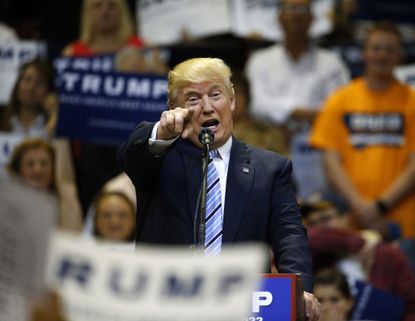Donald Trump is showing voters their ugliest beliefs. They won't like it.
There's a reason politicians usually use dog whistles...


Donald Trump's rhetoric is distinctive in many ways, but one of the most striking is how he takes what is ordinarily implied and makes it explicit. Instead of trying to convince you he's smart, Trump just says, "I have a very good brain." Instead of painting a detailed picture of the benefits his presidency will bring, Trump says, "I will give you everything. I will give you what you've been looking for for 50 years. I'm the only one."
When it comes to personal boasting, this tendency just makes Trump sound like a fool. But he also takes the kind of thing Republicans have long implied about Democrats and about the world, strips off the veneer, and shoves it right in everyone's face. Immigrants are criminals. Muslims should be kept out of America. I'm big and you're small.
There's a reason things like that are usually implied, not stated. It's because there are some ideas and opinions we don't want to believe we have, even if we do. Republicans have gotten very good at tickling those corners of the public id carefully, to generate the desired response without going overboard. But Trump doesn't do anything carefully.
Subscribe to The Week
Escape your echo chamber. Get the facts behind the news, plus analysis from multiple perspectives.

Sign up for The Week's Free Newsletters
From our morning news briefing to a weekly Good News Newsletter, get the best of The Week delivered directly to your inbox.
From our morning news briefing to a weekly Good News Newsletter, get the best of The Week delivered directly to your inbox.
So after the Orlando massacre, Trump decided to share his thoughts about Democrats and their loyalty to the country. At such a moment, you're supposed to say that your opponent "doesn't understand the threat," or that their ideas would make us more vulnerable. If you're asked whether you're challenging their patriotism, you say, "I'm not questioning my opponent's patriotism, I'm questioning her judgment."
But that's too subtle for Donald Trump. Talking after the Orlando shooting, he said, "Look, we're led by a man that either is not tough, not smart, or he's got something else in mind." Trump called for President Obama to resign because he doesn't utter the magical incantation "radical Islamic terror," the speaking of which will turn all of America's enemies to dust. When asked why, Trump said, "He doesn't get it or he gets it better than anybody understands — it's one or the other and either one is unacceptable."
"He gets it better than anybody understands." In other words, Obama is somehow in league with terrorists, or at least letting them mount attacks with impunity. And let's not forget, this is a man who went on a lengthy quest to prove that Obama wasn't born in the United States. There too, Republicans always favored implication; you're supposed to say "I take him at his word" that he's a Christian and an American, leaving open the possibility that he might not be while allegedly showing how magnanimous you can be.
If you asked Trump, he'd probably say this is all just proof that he's not "politically correct" like all those politicians, always measuring their words and trying not to offend. And that's what so many of his supporters cite as their main reason for backing him: He "tells it like it is," by giving voice to their prejudices and fears and hatreds.
What Trump doesn't seem to understand is that politicians clothe their ugliest appeals in subtle rhetoric so they can maintain deniability not just for themselves, but for those who would vote for them as well. When we respond to a politician's arguments, we construct a story for ourselves about how we came to believe what we do. We want to see ourselves as reasonable, informed, and unbiased. Almost no one wants to think they're filled with hatred or prejudice.
But Trump doesn't allow you to make a generous interpretation of your own motivations. If you're truly with him, you want to build those walls, keep people who don't look like you out of the country, and turn back the clock to a bygone time. He doesn't seem to understand that even if there are a substantial number of people who thrill when he tells a crowd to knock the hell out of a protester or says Mexicans are rapists, the number who do is nowhere near a majority. If he's to have any chance of winning, he'll have to appeal to millions of voters who don't think of themselves that way.
That could wind up being one of his biggest impediments to Trump winning a majority, even if his unsubtle appeal was why he won the Republican nomination. As the campaign goes on, Trump will likely make it harder and harder for moderate Republicans to vote for him, and nearly impossible for independents to do so — not just because of who he is, but because of what they fear voting for him would say about who they are. By the time we get to November, there may be nothing subtle about that.
Sign up for Today's Best Articles in your inbox
A free daily email with the biggest news stories of the day – and the best features from TheWeek.com
Paul Waldman is a senior writer with The American Prospect magazine and a blogger for The Washington Post. His writing has appeared in dozens of newspapers, magazines, and web sites, and he is the author or co-author of four books on media and politics.
-
 Magazine solutions - December 27, 2024 / January 3, 2025
Magazine solutions - December 27, 2024 / January 3, 2025Puzzles and Quizzes Issue - December 27, 2024 / January 3, 2025
By The Week US Published
-
 Magazine printables - December 27, 2024 / January 3, 2025
Magazine printables - December 27, 2024 / January 3, 2025Puzzles and Quizzes Issue - December 27, 2024 / January 3, 2025
By The Week US Published
-
 Why ghost guns are so easy to make — and so dangerous
Why ghost guns are so easy to make — and so dangerousThe Explainer Untraceable, DIY firearms are a growing public health and safety hazard
By David Faris Published
-
 US election: who the billionaires are backing
US election: who the billionaires are backingThe Explainer More have endorsed Kamala Harris than Donald Trump, but among the 'ultra-rich' the split is more even
By Harriet Marsden, The Week UK Published
-
 US election: where things stand with one week to go
US election: where things stand with one week to goThe Explainer Harris' lead in the polls has been narrowing in Trump's favour, but her campaign remains 'cautiously optimistic'
By Harriet Marsden, The Week UK Published
-
 Is Trump okay?
Is Trump okay?Today's Big Question Former president's mental fitness and alleged cognitive decline firmly back in the spotlight after 'bizarre' town hall event
By Harriet Marsden, The Week UK Published
-
 The life and times of Kamala Harris
The life and times of Kamala HarrisThe Explainer The vice-president is narrowly leading the race to become the next US president. How did she get to where she is now?
By The Week UK Published
-
 Will 'weirdly civil' VP debate move dial in US election?
Will 'weirdly civil' VP debate move dial in US election?Today's Big Question 'Diametrically opposed' candidates showed 'a lot of commonality' on some issues, but offered competing visions for America's future and democracy
By Harriet Marsden, The Week UK Published
-
 1 of 6 'Trump Train' drivers liable in Biden bus blockade
1 of 6 'Trump Train' drivers liable in Biden bus blockadeSpeed Read Only one of the accused was found liable in the case concerning the deliberate slowing of a 2020 Biden campaign bus
By Peter Weber, The Week US Published
-
 How could J.D. Vance impact the special relationship?
How could J.D. Vance impact the special relationship?Today's Big Question Trump's hawkish pick for VP said UK is the first 'truly Islamist country' with a nuclear weapon
By Harriet Marsden, The Week UK Published
-
 Biden, Trump urge calm after assassination attempt
Biden, Trump urge calm after assassination attemptSpeed Reads A 20-year-old gunman grazed Trump's ear and fatally shot a rally attendee on Saturday
By Peter Weber, The Week US Published